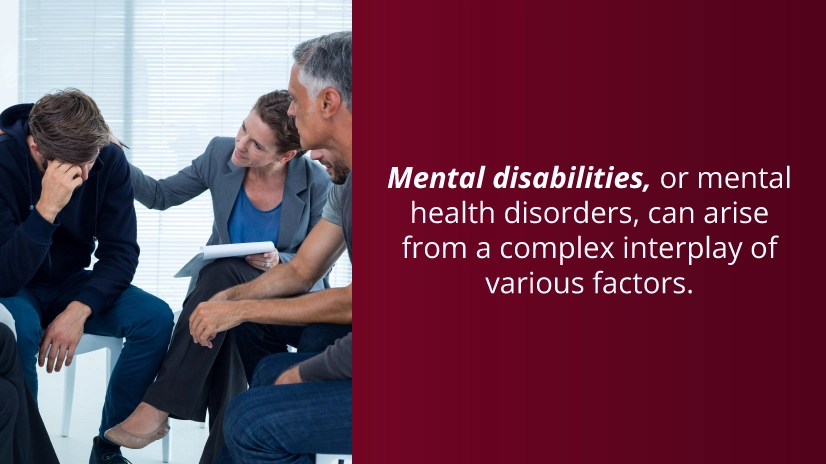
Navigating Life with Mental Disabilities
Mental disabilities, also known as intellectual or developmental disabilities, encompass a wide range of conditions affecting cognitive functions and adaptive behaviors. These disabilities can impact how individuals learn, communicate, and interact with others. Each person’s experience is unique and shaped by factors like genetics, environment, and early development.
Understanding and supporting individuals with mental disabilities involves promoting inclusivity, providing specialized education and therapies, and advocating for their rights and dignity in society.
Key Takeaways
In the United States, mental disabilities are recognized under the Americans with Disabilities Act (ADA), which protects individuals from discrimination in various aspects of life. Here’s what you need to know:
- Mental disabilities can vary widely in type and severity, affecting how individuals think, feel, and behave.
- Support for individuals with mental disabilities should prioritize dignity, autonomy, and inclusive opportunities.
- Effective advocacy and accommodations can significantly enhance the quality of life for those with mental disabilities.
Contact Indiana Center for Recovery at (844) 650-0064 for more health information and receive higher-level mental health care when dealing with medical conditions.

Types Of Mental Disabilities
Mental disabilities, also known as mental disorders or mental health conditions, encompass a wide range of issues that affect a person’s thinking, feelings, behavior, or mood.
Here are some common types type of mental illness or disabilities:
Cognitive Disabilities
Cognitive disabilities affect a person’s ability to process information. These disabilities can impact memory, problem-solving skills, and attention. For example, someone with a traumatic brain injury may struggle with short-term memory loss.
Cognitive disabilities can also result from conditions like dementia or stroke. People with these serious mental illnesses often need assistance with daily tasks, making adaptations in the workplace and at home essential for their independence and quality of life.
Developmental Disabilities
Developmental disabilities are a group of conditions that occur during the developmental phase, typically before the age of 22. These disabilities can cause physical, learning, language, or behavioral impairments. Common examples include autism spectrum disorder, cerebral palsy, and Down syndrome.
Individuals with developmental disabilities may experience challenges in communication and social interaction. Early intervention and ongoing support are crucial to help them achieve their full potential and lead fulfilling lives.
Intellectual Disabilities
Intellectual disabilities, also known as intellectual developmental disorders, involve limitations in intellectual functioning and adaptive behaviors. This means individuals with these disabilities have difficulties with reasoning, learning, and problem-solving.
They might also struggle with practical skills such as managing money, communication, and self-care. The severity of intellectual disabilities varies, but with appropriate educational and social support, individuals can lead productive and satisfying lives.
Psychiatric Disabilities
Psychiatric disabilities refer to a range of mental health conditions that significantly impact an individual’s thoughts, emotions, and behavior. These include disorders like schizophrenia, substance use disorder, bipolar disorder, major depressive disorder, and anxiety disorders.
Psychiatric disabilities can affect one’s ability to work, maintain relationships, and perform daily activities. However, many people with psychiatric disabilities manage their symptoms effectively with the right combination of therapy, psychiatric medication, and support.
It’s essential to promote mental health awareness and reduce stigma, ensuring that individuals with psychotic disorders receive the care and acceptance they deserve.
Causes And Risk Factors
Mental disabilities, or mental health disorders, can arise from a complex interplay of various factors.
Here are some common causes and risk factors:
Genetic Factors
Genetic factors play a crucial role in the development of mental disabilities or significant deficits. Some mental health conditions, such as schizophrenia, bipolar disorder, and autism, have strong genetic links. If a family member has a mental disorder, the likelihood of developing a similar condition increases.
Research shows that specific genes can affect brain function and increase vulnerability to mental illnesses. However, having these genes does not guarantee that an individual will develop a mental disability; it merely raises the risk.
Environmental Factors
Environmental factors significantly influence mental health. Childhood trauma, such as abuse or neglect, can lead to long-term mental health issues. Exposure to chronic stress, poverty, and unstable living conditions can also contribute to mental disabilities.
Substance abuse, including drugs and alcohol, can exacerbate or trigger mental health problems. Furthermore, societal factors like discrimination, social isolation, and lack of access to mental health services can worsen mental health outcomes. The environment in which a person grows up and lives plays a vital role in shaping their mental well-being.
Psychological Factors
Psychological factors are key in the development of mental disabilities. Personality traits, such as high levels of neuroticism or low levels of resilience, can make individuals more susceptible to mental health issues. Negative thinking patterns, low self-esteem, and chronic anxiety are also risk factors.
Experiences of loss, trauma, or significant life changes can trigger or worsen mental disabilities. The way individuals cope with stress and adversity influences their mental health. Effective coping mechanisms and a positive outlook can mitigate the impact of psychological risk factors on mental health.
Diagnosis And Assessment
Diagnosis and assessment of mental health disorders, including impulse control disorders, involve a comprehensive evaluation by healthcare professionals. This process typically includes the following steps.
Professional Evaluation
Professional evaluation is the first step in diagnosing mental disabilities. Qualified mental health professionals, such as psychiatrists, psychologists, and licensed clinical social workers, conduct these evaluations. They gather comprehensive information about an individual’s symptoms, medical history, and personal background.
This process often involves interviews with the person experiencing symptoms and sometimes with family members or close friends. The goal is to understand the severity and impact of mental disability on daily life. Professional evaluations ensure that the diagnosis is accurate and that the individual receives the most appropriate treatment and support.
Diagnostic Tools And Tests
Mental health professionals at psychiatric hospitals use various diagnostic tools and tests to identify mental disabilities. These tools include structured interviews, questionnaires, and psychological assessments.
Structured interviews involve a series of standardized questions designed to gather detailed information about symptoms and behaviors. Questionnaires, such as the Beck Depression Inventory or the Generalized Anxiety Disorder 7-item scale, help quantify the severity of symptoms.
Psychological assessments, like the Minnesota Multiphasic Personality Inventory (MMPI), provide deeper insights into an individual’s mental state. In some cases, neuroimaging techniques like MRI or CT scans might be used to rule out physical causes of symptoms. These tools collectively provide medical evidence of an individual’s mental health.
Common Challenges In Diagnosis
Diagnosing mental disabilities can be challenging for several reasons. One major challenge is the overlap of symptoms between different mental disorders. For example, symptoms of anxiety and depression often coexist, making it difficult to pinpoint a specific diagnosis. Additionally, individuals may not always recognize or disclose their symptoms due to stigma or fear of judgment.
This lack of communication can lead to misdiagnosis or delayed diagnosis. Another challenge is that mental disabilities can present differently in each person. Factors like age, gender, and cultural background can influence how symptoms manifest.
Impact on Daily Life
Living with a mental disability affects many parts of daily life. Simple tasks like getting dressed or going to school can feel overwhelming. People with mental disabilities often face unique challenges that require extra support and understanding.
Educational Challenges
According to American Psychiatric Association research, students with mental-related disorders often struggle in school. They may have trouble focusing, remembering lessons, or handling stress. These challenges can make learning difficult, leading to lower grades and frustration.
Schools can help by offering special programs, extra time for tests, and one-on-one support from teachers or aides. Understanding and patience from classmates and teachers can also make a big difference.
Employment And Career Impact
Finding and keeping a job can be hard for people with areas of mental functioning. They might need help with communication, time management, and handling job-related stress. Employers can help employees by providing reasonable accommodations, like flexible hours, clear instructions, and a supportive work setting. With the right support, people with mental disabilities can thrive in their careers and make valuable contributions to their workplaces.
Social and Interpersonal Relationships
Building and maintaining relationships can be challenging for individuals with neurodevelopmental disorders. They might struggle with understanding social cues, making friends, or dealing with conflicts.
This can lead to feelings of isolation, loneliness, and suicidal thoughts. Support from family, friends, and community programs can help improve social skills and build confidence. Encouraging inclusive activities and fostering a compassionate environment can also help individuals with mental disabilities develop strong and positive terms.
Treatment And Support Options For Mental Disability
Treatment and support options for mental disabilities can vary depending on the specific condition and individual needs.
Here are some common approaches:
Medical and Therapeutic Interventions
Doctors often prescribe medications to help manage symptoms of mental disabilities. These medicines can balance chemicals in the brain, improving mood and behavior. Therapy, like cognitive-behavioral therapy (CBT), helps people understand and change negative thought patterns. Regular check-ups with healthcare providers ensure treatments are effective and adjusted as needed.
Behavioral Therapy
Behavioral therapy teaches new skills and ways to cope with daily challenges. It focuses on changing harmful behaviors and reinforcing positive actions. Therapists work with individuals to set goals and practice new strategies. For example, someone with anxiety might learn relaxation techniques to manage stressor-related disorders. Consistent practice and support can lead to significant improvements.
Support Services and Programs
Support services provide essential help for individuals with neurocognitive disorders. These services include vocational training, educational assistance, and social skills development. Programs like job coaching and supported employment help people find and keep jobs.
Educational support ensures students receive the necessary accommodations to succeed in school. Community programs offer recreational activities, fostering social connections and reducing isolation.
Role Of Family And Caregivers
Family and caregivers play a crucial role in the treatment and support of young adults with mental disabilities. They provide emotional support, assist with daily activities, and help manage treatment plans. Caregivers often advocate for their loved ones, ensuring they receive the best possible care.
Education and support for families are vital, as well-informed caregivers can better support their loved ones. Support groups offer a space for families to share experiences and learn from others facing similar challenges.
Frequently Asked Questions (FAQ)
A mental disability refers to a condition that significantly impacts a person’s cognitive, emotional, or behavioral functioning. It can include disorders such as major depression, anxiety, bipolar disorder, schizophrenia, attention deficit hyperactivity disorder, obsessive-compulsive disorders, and intellectual disabilities.
These conditions may impair daily activities, social interactions, and decision-making abilities. The presence of a mental disability often requires accommodations and support to mitigate its effects on an individual’s life and well-being.
An example of a psychological disability is post-traumatic stress disorder (PTSD). PTSD can develop after experiencing or witnessing a traumatic event or natural disaster, causing symptoms like flashbacks, nightmares, severe anxiety, and avoidance of triggers associated with the trauma. It can significantly disrupt daily life, relationships, and work functioning.
Supportive environments and accommodations, like flexible work schedules or therapy sessions, can help individuals with PTSD manage their condition and improve their quality of life.



